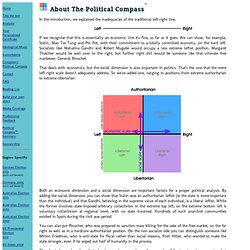

Political Compass - Analysis. In the introduction, we explained the inadequacies of the traditional left-right line.

If we recognise that this is essentially an economic line it's fine, as far as it goes. We can show, for example, Stalin, Mao Tse Tung and Pol Pot, with their commitment to a totally controlled economy, on the hard left. Socialists like Mahatma Gandhi and Robert Mugabe would occupy a less extreme leftist position. Margaret Thatcher would be well over to the right, but further right still would be someone like that ultimate free marketeer, General Pinochet.
That deals with economics, but the social dimension is also important in politics. Both an economic dimension and a social dimension are important factors for a proper political analysis. You can also put Pinochet, who was prepared to sanction mass killing for the sake of the free market, on the far right as well as in a hardcore authoritarian position. A Word about Neo-cons and Neo-libs Thanks from the Political Compass team. US Election 2012. Jonathan Rée - Book review: The Righteous Mind by Jonathan Haidt. The Righteous Mind: Why Good People Are Divided by Politics and Religion by Jonathan Haidt (Allen Lane) Jonathan Haidt is a world leader in the new discipline of cultural psychology, which combines the psychologist’s understanding of what goes on inside our heads with the anthropologist’s interest in the social meanings that surround us.

Cultural psychology applies the principles of Darwinian natural selection to problems about morality, consciousness and human existence, and Haidt believes that it offers definitive evidence-based solutions to the problems that have been baffling philosophers since the dawn of civilisation. He is an enthusiastic public advocate for his discipline, with streams of anecdotes about all those wonderful people – teachers, colleagues, friends, students, parents, wife and kids – without whom he would not have been able to rise to the top of his game. ‘The Righteous Mind,’ by Jonathan Haidt. Intro. Morality Quiz/Test your Morals, Values & Ethics - Your Morals.Org. We Feel Fine / by Jonathan Harris and Sep Kamvar. Online Communities Activity Spring/S... Online Communities Map Spring 2007 (Courtesy of XKCD: ) 1% rule (Internet culture) Pie chart showing the proportion of lurkers, contributors and creators under the 90–9–1 principle In Internet culture, the 1% rule is a rule of thumb pertaining to participation in an internet community, stating that only 1% of the users of a website actively create new content, while the other 99% of the participants only lurk.
A variant is the "90–9–1 principle" (sometimes also presented as the 89:10:1 ratio),[1] which states that in a collaborative website such as a wiki, 90% of the participants of a community only view content, 9% of the participants edit content, and 1% of the participants actively create new content. Both can be compared with the similar rules known to information science, such as the 80/20 rule known as the Pareto principle, that 20 percent of a group will produce 80 percent of the activity, however the activity may be defined.
The actual percentage is likely to vary depending upon the subject matter. Sturgeon's Law. Michael Sandel: The lost art of democratic debate. Ken Robinson says schools kill creativity. Richard Seymour: How beauty feels. Derek Sivers: How to start a movement. Daphne Koller: What we're learning from online education. Philosophy: What does this quote mean -"It is not the difficulty of loving one's enemy that matters when the essence of the merit of doing so is concened, excepting in so far as the perfection of love wipes out the difficulty." Armchair Philosophy. Morals and Morality: Is it wrong for a family to eat a dog that was run over.
Morals and Morality: Is it wrong for a brother and sister to have sex one time if they use protection. Morals and Morality: Is it wrong for a man to have sex with a chicken before eating it. Philosophy: What is logical positivism. The Big Philosophical Questions. Philosophy: Why don't people's minds change when their arguments are refuted. Josef Pieper: Sisyphus and the Defense of Leisure.